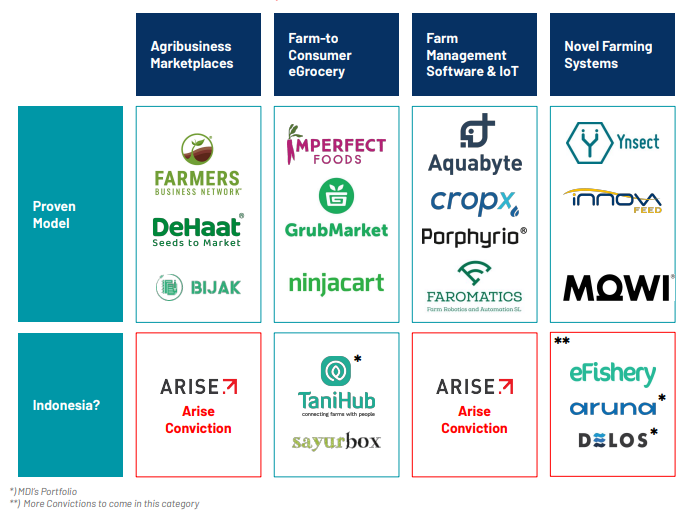Agritech Startup Semaai Receives Initial Investment from Surge and Beenext
The fresh funds will be used to expand the delivery network and add a team of engineers and products to the Indonesian office
Startups agritech Semaai announced an initial round of funding of $1,25 million or approximately 18 billion Rupiah led by Surge, the acceleration program of Sequoia Capital India; and Beenext. Amount angel investors, like Nipun Mehra (Ula), Harshet Lunani (Qoala), and Prashant Pawar (Houlihan Lokey), also participated in this round.
The funds will be used to expand the delivery network, starting from farmer shops (agricultural retailers) which will eventually reach small farmers in rural areas. Also, adding a team engineer and products to be placed in India to triple by the end of this year.
The startup was founded in April 2021 by Muhammad Yoga Anindito, Abhishek Gupta, and Gaurav Batra. Each has a strong background in agriculture and supply chains. Yoga previously led his own agricultural input distributor company, then Hasana has in-depth knowledge of agricultural supply chains. Meanwhile, Abhishek has experience working with the government to lead various rural projects in agribusiness, fintech, and policies.
Goodbye ambition is to provide millions of rural farmers and MSMEs with opportunities to create sustainable livelihoods and access to better financing, services and new markets. Through a growing network of service delivery centers, Semaai provides a full range of agricultural services, such as specialized consulting, productivity tools and agricultural inputs such as seeds and fertilizer products.
Agriculture in Indonesia is a S$100 billion industry comprising 13,5% of the country's GDP, and is supported by more than 40 million farmers and small businesses in rural areas – nearly a third (29%) of Indonesia's workforce. Most of the agricultural workforce consists of small farmers, small scale farmers, and rural MSMEs such as farmer shops, which are small agricultural retailers that supply production facilities (saprodi) and agricultural equipment (alsintan) to small farmers.
Despite their enormous contribution to the Indonesian economy, these rural farmers and MSMEs face major challenges in sustaining their livelihoods. In fact, the middle class's demand for diverse food products is increasing. However, they have not been able to take advantage of this moment due to the highly fragmented and complex agricultural supply chain in Indonesia, which ultimately leads to unclear pricing, lack of access to affordable inputs and agricultural machinery, and huge gaps in supply and demand.
Semaai aims to address these systemic problems by offering a comprehensive range of services to rural farming communities. This startup combines special consultations through a team of agronomists, access to modern technology as well as production inputs and agricultural machinery at affordable prices such as seeds, pesticides and fertilizers.
Semaai Co-founder Muhammad Yoga Anindito said, digitizing MSMEs in the upstream agricultural sector has the potential to become a g for Indonesian agroecosystems. We believe in leveraging technology to change the mindset and way farmers and MSMEs conduct their activities, and equip them with the tools and skills needed to maximize their profits.
“We believe that together with our experienced team and approach online ke offline Uniquely, we are able to grow exponentially to make a meaningful impact for more farmers. We will use the funds from this fundraiser to strengthen our team, deepen our distribution system and expand throughout Indonesia," he said in an official statement, Tuesday (15/2).
With this solution, it is claimed that since five months of launch, Semaai has succeeded in increasing the GMV of products sold to farm shops and cooperatives by 10 times. This figure will be increased in line with the company's ambition to reach and benefit 100 small farmers and rural MSMEs next year.
Supply chain challenges in the agricultural industry
The solutions offered by Semaai are not new, previously many startups have entered offering efficiency solutions in the agricultural supply chain. In a publication entitled "Yielding Next Gen. Agri Conglomerate Leveraging Tech Orchestration", Arise highlights four pain points key in the agricultural supply chain. Namely, limited access to capital, fragmented and inefficient supply chains, lack of access to technology, and price uncertainty due to climate change.
While this sector has enormous industrial potential, its value could exceed $500 billion of global GDP by 2030. Contributions from Asia Pacific countries are estimated to contribute 8,2% of the total value. Seeing this trend, in the global arena of investment for startups argitech also continues to increase from year to year. In 2020, there were approximately 834 funding deals, accounting for more than $6,7 billion.
Even though the player agritech many have appeared – including some that are ready soonicorn such as Tanihub, Eden Farm, Aruna, and eFishery—the Arise team still sees that there are some gaps that have not been filled by digital innovations—as well as investment opportunities that are still open—one of which is related to the B2B marketplace that meets the needs of farmers. Next, Arise will look at management services and IoT that can help farmers manage their land.
On the global scene, several startups agritech managed to record extraordinary traction, including in relation to recorded investments. Recently, DeHaat, an Indian startup with a similar business model to Agriaku, recently raised $115 million in Series D funding from Lightrock, Sequoia Capital India and Temasek Holdings, among others.

Sign up for our
newsletter
